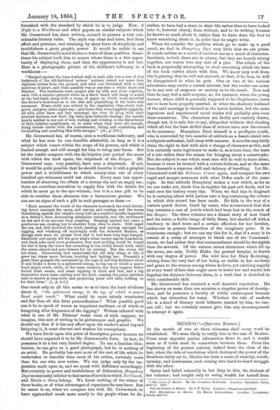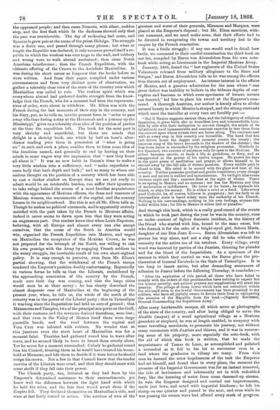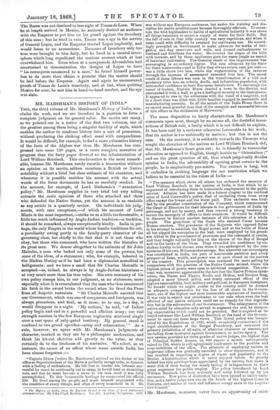MEXICO.*—[SEcosn NOTICE.]
IN the mouth of two or three witnesses shall every word be established. We seem likely to verify this in the case of Mexico. From most opposite parties information flows in, and it would seem as if truth must lie somewhere between them. From the beginning of the present century, indeed from the close of the last, when the tide of revolution which destroyed the power of the Bourbons fairly set in, Mexico has been a scene of anarchy, revolt, tyranny, and lawlessness, each coming into hand-to-hand struggle with the other.
Spain had failed miserably in her duty to this, the choicest of her colonies ; had sought only to wring wealth for herself from
• The Court of Mexico. By the Countess Kollonitz. London Saunders, °Hey,. and Co. 1867.
With the French in Mexico. By J. F. Elton. London : Chapman and Hall.
With Maximilian in Marko. By Baron Alvensleben. London: Longman, Green, and Co. the oppressed people ; and then came Nemesis, with silent, sudden step, and the first flash which lit the darkness showed only that the past was irretrievable. The day of reckoning had come, and Spaniards grew pale at the name of the priest Hidalgo. The struggle was a fierce one, and passed through many phases ; but when at length the Republic was declared, it only too soon proved itself a re- public in which the weakest was ever to go to the wall, and robbery and wrong were to walk abroad unchained ; then came North American interference ; then the French Expedition, with the ultimate offering of the Crown to the Archduke Maximilian. It was during his short career as Emperor that the books before us were written. And from their pages, compiled under various circumstances and from very distinct posts of observation, we gather a tolerably clear view of the state of the country over which Maximilian was called to rule. The restless spirit which was everywhere abroad had gathered double strength from the know- ledge that the French, who for a moment had been the representa- tives of order, were about to withdraw. Mr. Elton was with the French during the last moments of their stay in the country, and his diary, put, as he tells us, into its present form in " order to pass away idle time during a stay at the Havannth and a journey up the Mississippi," gives us a tolerably clear idea of the position of parties at the time the expedition left. The book for the most part is very sketchy and superficial, but there are minds that delight in a sketchy book, one which by half an hour's after- dinner reading puts them in possession of " what is going " in such and such a place, enables them to form some idea of the localities named, and generally to end. by leaving on their minds in some vague way the impression that " now they know all about it." It was no new habit in Bacon's time to make a very little wisdom into a sufficiency, and " make superficies to seem body that hath depth and bulk ;" and so many to whom one serious thought on the position of a country which has been able to cast a darker shadow on Europe than we are yet ready to admit would be an intolerable burden, can suffer their ignorance to take refuge behind the screen of a most familiar acquaintance with the appearance of Mexican officers, the dress and manners of Mexican women, the amusements of the capital, and the country houses in its neighbourhood. But this is not all Mr. Elton tells us. 'Though he makes no political comments, and is apparently entirely satisfied with the part taken by the French in Mexican affairs, indeed it never seems to dawn upon him that they were acting an ungenerous part. Our readers know that when Louis Napoleon, believing, with all Europe and almest every one else except ourselves, that the cause of the South in America would win, organized the French Expedition into Mexico, and urged on Maximilian the acceptance of the Mexican Crown, he was not prepared for the triumph of the North, nor willing to risk his own prestige with the Army by engaging French soldiers in the weary struggle, the inevitable result of his own short-sighted policy. It is easy enough to perceive, even from Mr. Elton's partial showing, that the withdrawal of the French troops rendered the Emperor's position doubly embarrassing. Repeatedly in various forms he tells us that the Liberals, emboldened by the approaching evacuation of the country by the French, made sure their day was coming, and that the large cities would soon be at their mercy ; he has clearly described the almost desperate case of Maximilian at the beginning of the present year, when, he tells us, the whole of the north of the country was in the power of the Liberal party ; that in Tamaulipas it was long since the Imperialists had held an acre of ground ; that Matamora8 and Tampico, two of the principal sea-ports on the Gulf, with their customs and the revenues derived therefrom, were lost ; and that even in the Valley of Mexico itself there were large guerrilla bands, and the road between the capital and Vera Cruz was infested with robbers. No wonder that at this juncture even the stout heart of Maximilian was for a moment faint. Troubles had gathered round him in wave after -wave, and he seemed likely to have to breast them utterly alone. Yet he never for a moment succumbed. Calmly he gathered round lira his Council, trusting them as he would have trusted his house- bold at Miramar, and left them to decide if it were better he should resign his crown. Not a few in that Council knew that the tender mercies of the Liberals were cruel, and that they should meet with scant shrift if they fell into their power.
The Church party, too, irritated as they had been by the Emperor's determined resistance to their encroachments, yet knew well the difference between the light hand with which he held the reins, and the fate that would await them if the Empire fell. They declared themselves on Maximilian's side, and were at last fairly roused to action. The services of two of the greatest and worst of their generals, Miramon and Marquez, were placed at the Emperor's disposal ; but Mr. Elton mentions, with- out comment, and we need make none, that their efforts had to be directed to recapturing the towns and territory lost to the empire by the French evacuation.
It was a futile struggle ; if any one would read in detail how futile, we commend to their careful examination the third book on our list, compiled by Baron von Alvensleben from his own note- book while acting as Lieutenant in the Imperial Mexican Army.
January, 1866, found the " last regiments of the United States Volunteers released from military allegiance to the Stars and Stripes," and Baron Alvensleben tells us he was among the officers thus thrown out of employment. An intense interest in the affairs of Mexico, and a genuine admiration for the man whose " one great defect was inability to believe in the hideous depths of cor- ruption and baseness to which some specimens of human nature can descend," led him to place his sword at the Emperor's com- mand. A thorough Austrian, our author is keenly alive to all the natural beauty in which Mexico is steeped, and the strong contrasts which meet the traveller at every turn are forcibly put :— " But if Mexico suggests serious ideas, and the full bigotry of religious fanaticism, it gives birth also to boundless love and irreconcilable hate. Side by side with their inclination to earnest thought, the minds of its inhabitants need immeasurable and constant exertion to tear them from the current upon whose stream they are borne along. The contrasts met with at every step in this country are incredible. The hand that has just driven home the dagger next moment counts the rosary ; the amorous song of the bravo resounds in the shadow of the cloister ; the licentious dance is succeeded by the religious procession. Similarly to the Spaniard, two courses of existence only lie open to the Mexican. He either becomes ascetic, or leads a life as grandiose, as fiery, and as exaggerated as the genius of his native tongue. He passes his days in the quiet peace of meditation and prayer, or allows himself to be carried away by the full tide of violent passions. Every middle path is closed to him. His mind is in accord with the glare and heat of his country. Neither possesses gradual and gentle transitions; every change in man and nature is sudden and instantaneous. No twilight intervenes between night and day ; summer flees at the sight of winter. There is no spring in Mexico, and no autumn ; nor has the Mexican any idea of moderation or indifference. He loves or he hates ; he applauds his friend, or slays his enemy. He is either a saint or a fiend. Like every good Catholic, he, of course, believes in purgatory ; but his faith in an intermediate state is based solely upon the authority of his Church. Nothing in his surroundings, nothing in his own feelings, arouses this belief within him ; for life in Mexico is either hell or paradise."
And through this book, which is a really good record of the events in which he took part daring the year he was in the country, runs an under- current of lighter domestic incident, in the history of the friend who started with him, bound to the same cause, but who forsook it for the sake of a bright-eyed girl, Senora Maria,
daughter of one Don Juan Z—. Baron Alvensleben was left to pursue his way alone, and not a step did he take without the necessity for the active use of his revolver. Every village, every wood was haunted by parties of the Juarists, thirsting for plunder and for the blood of the Imperialists. As a specimen of the manner in which they carried on war, the Baron gives the pro- clamation of General Escobedo in the State of Tamaulipas. It is too long to insert entire, but after demanding assurances of adhesion to Juarez before the following Thursday, it concludes :—
"After the expiration of this period, all those who have failed to comply with the orders of this proclamation have nothing to expect but the utmost severity, and neither prayers nor supplications will avert the penalty. The pillage of those towns which have not submitted within the aforesaid term to the lawful Government has been promised to my soldiers, who have all joyfully sworn to devote their lives to eitirpating the enemies of the Republic from the land.—(Signed) E80013BDO, General Commanding the Republican Army."
After many hairbreadth• escapes, all which serve as photographs of the state of the country, and after being obliged to serve the Alcalde (mayor) of a small agricultural village as a Mexican ganadero or shepherd, he was at length enabled, in company with some travelling merchants, to prosecute his journey, not without many encounters with Juarists and thieves, and it was in recover- ing some of his property, more especially the note-book, with the aid of which this book is written, that he made the acquaintance of Tomas de Leon, as accomplished and polished a scoundrel as it fell to his lot to encounter even in a land where the graduates in villany are many. From this man he learned the utter hopelessness of the task the Emperor had set himself, and found that in every place, the moment the pressure of the Imperial Government was for an instant removed, the tide of lawlessness and inhumanity set in with redoubled fury, like the bursting of water from some dammed-up stream. In vain the Emperor designed and carried out improvements, made just laws, and acted with impartial kindness ; he left his stamp on one quarter and passed to the next, and even while he was passing the return wave had effaced every mark of progress.
The Baron was not destined to lose sight of Tomas de Leon. When he at length arrived in Mexico, he anxiously desired an audience with the Emperor to put him on his guard against the treachery of this man ; but he tried in vain, Tomas was a spy in the service of General Lopez, and the Emperor trusted Lopez implicitly, and would listen to no accusations. Rumours of treachery only too true were brought to him daily, but he lived in a mental atmo- sphere which long repudiated the noxious current which at last overwhelmed him. Even when at a masquerade Alvensleben had ascertained to demonstration the designs of Lopez to have " los estranjeros massacred to a man," he found himself power- less to do more than obtain a promise that the matter should be laid before the Emperor. Again and again he encountered proofs of Tomas de Leon's treachery, and at last, when quitting Mexico for ever, he met him in hand-to-hand combat, and the spy was slain.
































 Previous page
Previous page